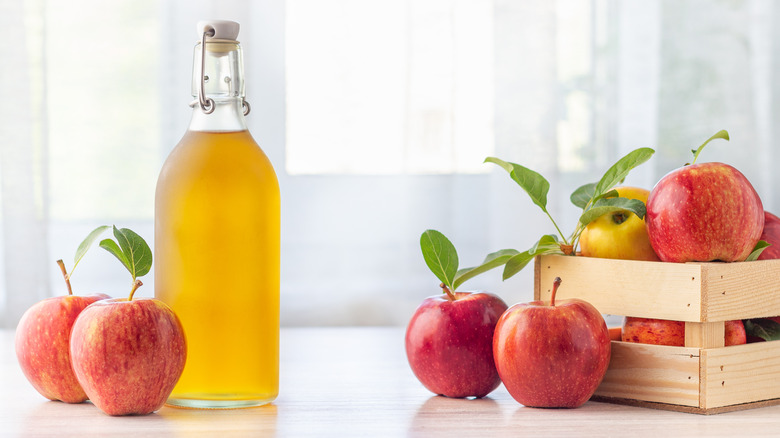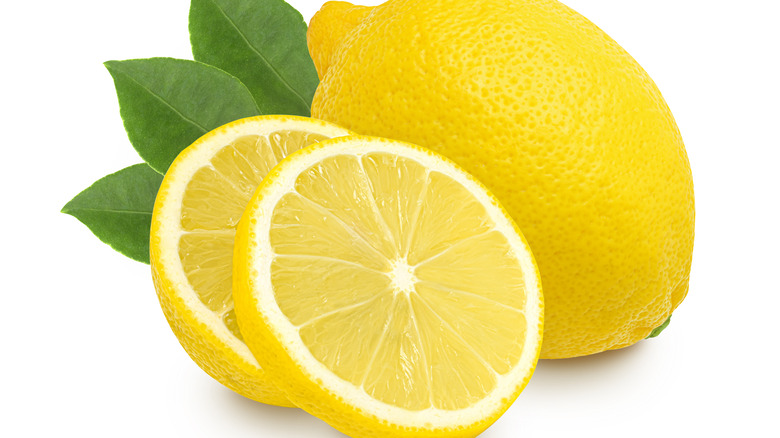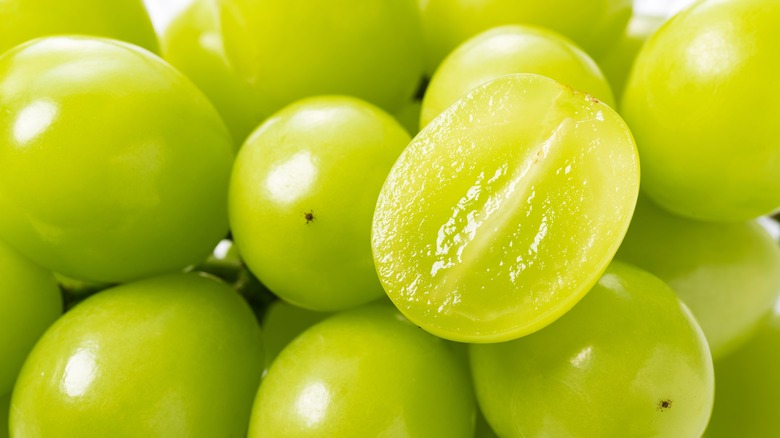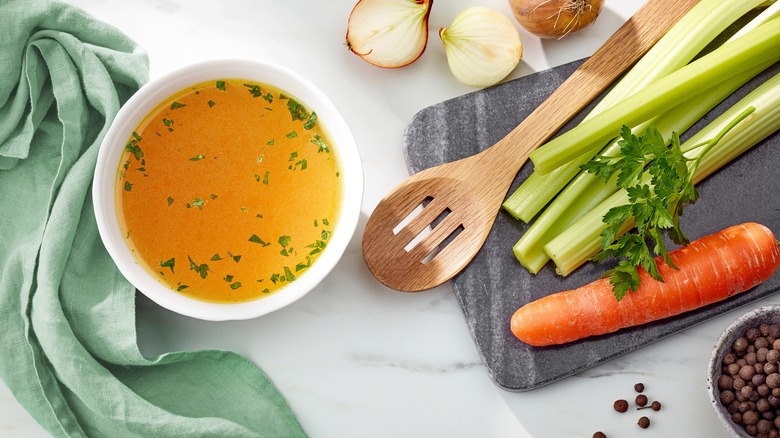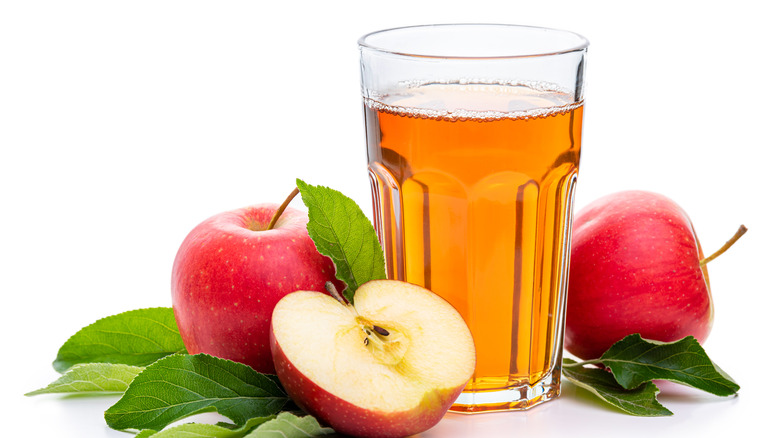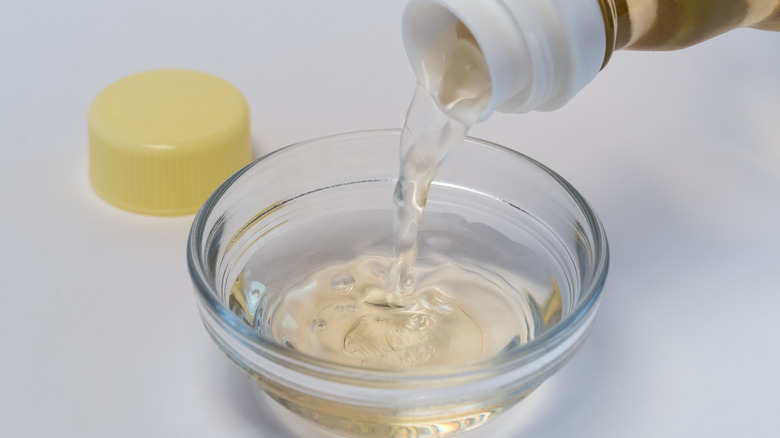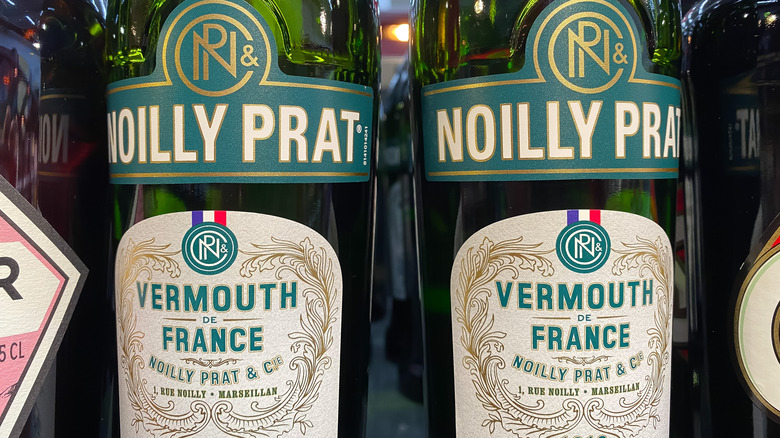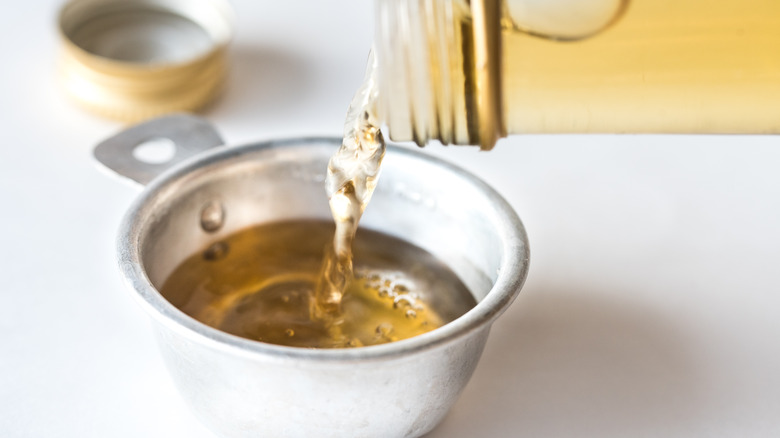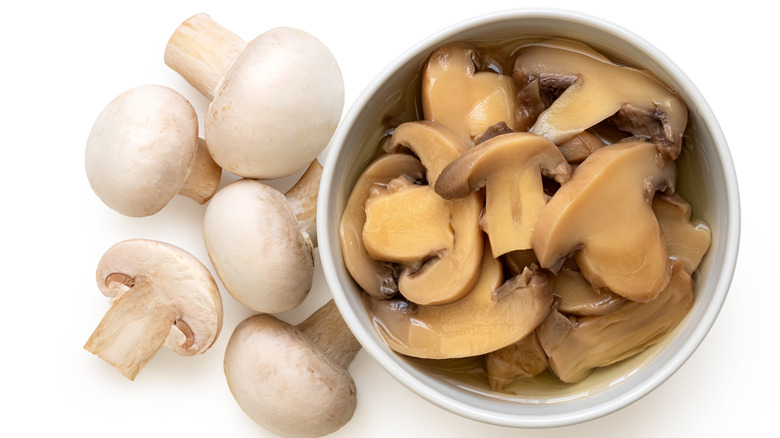12 Substitutes For White Wine When Cooking
White wine is an ingredient in a surprising number of recipes, from shrimp scampi to desserts like poached peaches; this versatile ingredient can transform a dish. Several varieties of white wine are used in the kitchen, and each has its own distinct characteristics. Some white wines add the right amount of acidity, and others add the perfect amount of sweetness. White wine can save a dry dish by adding much-needed moisture and can even tenderize a tough chunk of meat. It's an excellent ingredient to keep stocked in your pantry.
But what do you do when you are knees deep in a recipe and realize you are out of this key ingredient? Luckily, you have several options to replace white wine in a dish, and most of them are probably already sitting on the shelves in your cupboard.
When it comes to substituting white wine in a recipe, not all substitutions are equal. The first step to choosing which white wine substitute will work best is to take a close look at the recipe and determine what the white wine is bringing to the dish. Is it adding a rich flavor or aroma? Or, is it deglazing a pan to bring the caramelized goodies to a sauce? Once you determine how the white wine enhances the recipe, you can choose the best white wine substitute to keep your meal on track.
Apple cider vinegar
Apple cider vinegar is a common kitchen staple made from fermented apples. In the past, it was used as a cleaning solution and applied to the skin to treat minor ailments (via Healthline). Today, this amber-colored vinegar is commonly added to salad dressings and marinades for a bright burst of flavor. It has a tangy, almost sour taste that brings a simple green salad to life. But it is more than just a salad enhancer; it is also a great substitute for white wine in recipes that call for a dry white wine.
When replacing white wine with apple cider vinegar, use the same amount of vinegar as you would white wine, notes Wine Insiders. If you have a sensitive stomach, you may want to use a little less apple cider vinegar or dilute it with a bit of water because apple cider vinegar has an acidic taste that can be hard on sensitive digestive systems. This substitute works best with any recipe that calls for a mix of subtly sweet flavors and a tangy bite, for example, lemon chicken, poached vegetables, and white fish.
Ginger ale
Ginger ale, the fizzy drink that most of us only reach for when we have an upset tummy, is actually a great substitute for white wine. Since ginger ale is sparkling water with some ginger flavoring and sugar, it has the sweetness of a soda with the mild spice of ginger. Because of the sweet flavor, this is best to use in recipes that call for a sweet white wine like a riesling.
When shopping for ginger ale, be careful not to confuse ginger ale and ginger beer, because they are not the same. While both ginger ale and ginger beer are non-alcoholic and are often used in mocktails, they have two key differences. Firstly, ginger beer has a stronger ginger flavor because it's fermented, giving it a deeper flavor. And secondly, ginger ale has more sugar than ginger beer. So when you are choosing a replacement for white wine, reach for a ginger ale because it matches the flavor profile better with its slightly acidic taste. Ginger ale is similar enough to white wine that you can replace it with the same amount; just be mindful of the sugar content.
While ginger beer, with its more robust concentrated ginger flavor, is not an ideal substitute for white wine because it will alter a dish, that doesn't mean you shouldn't ever use it in the kitchen. Ginger beer can work in a dish where ginger is a key player, like a stir fry or pork rillettes.
Lemon juice
Many home chefs already know that lemon juice is the secret ingredient that brightens up bland dishes. A simple splash of this yellow citrus fruit adds another dimension of fresh flavor that can take a meal from good to great. But, did you know that lemons also have another superpower? They can substitute for white wine in many recipes.
You are probably thinking that that doesn't sound right, and you're probably thinking that lemons are too sour and are missing the dry component of crisp white wine — and you would be right. So, when using lemon juice as a substitute for white wine, you will need to use a mix of half lemon juice and half water so you can keep the all-important acidity but cut down on the unwanted sourness. When cooking with lemons, make sure to use fresh lemons and remove the seeds to avoid unwanted bitterness.
This substitute works best in savory dishes and marinades because the lemon can tenderize the protein while infusing it with a delicate flavor. Likewise, this substitution is an excellent option for deglazing a pan of chicken or fish for the last little caramelized bits.
White grape juice
It is no surprise that white grape juice can substitute for white wine in a recipe. While some grapes are grown for eating and others are for drinking, and there are wide varieties of both. In the end, they are still grapes and share a base flavor.
White grape juice has the same fruity flavor as white wine but isn't fermented, making it a great non-alcohol alternative to white wine. Of course, white grape juice is much sweeter and lacks the acidic component that white wine brings to the recipe. Luckily, adjusting it for savory recipes is an easy workaround; just add a splash of lemon or vinegar to round out the sweetness and amp up the acid.
If you are using white grape juice to replace white wine in a sweet dish, you can adjust the sweetness by simply mixing it with water. The best ratio to keep the sweetness at bay is to replace a ½ cup of wine with a ¼ cup of white grape juice and a ¼ cup of water. If it is still too sweet, you can use less white grape juice and more water. You can also adjust the amount of sugar that goes into the recipe and let the white grape juice replace some of the sugar in the recipe.
Beer
If you are out of white wine, then a frothy, foamy beer will do the trick. It has a similar flavor profile as white wine and has a slightly sweet, acidic taste that makes it an excellent choice.
If you have visited your local brewery lately, you may have been overwhelmed by the number of different beers available. Brewing beer is an art form, and each beer has distinct characteristics. So before you replace white wine in a recipe with beer, you will need to understand the dish and whether a porter or a pale ale is the right choice.
But, seriously, with so many types of beer, how do you choose which one to use? Well, in savory dishes, it depends on the protein. If you are using it in a marinade for steak, then a dark beer, like a stout, is going to have enough flavor and sharpness. If seafood is on the menu, then substitute white wine with a lighter beer like a pilsner or lager. If you are making a chicken dish, a fruity-infused ale can do the trick.
There are no set rules when cooking with beer, so you might need to experiment to find the best one. Just be mindful of the bitter factor; some beers, like IPAs, are quite bitter and can destroy a dish. If you do make that mistake and your dish is too bitter, a quick fix is to add honey or sugar to balance it out.
Chicken broth
Chicken broth is another popular substitute for white wine in cooking. It adds a nice depth of flavor and isn't overpowering. Ideally, you should use homemade chicken broth instead of store-bought since the store-bought cans of broth are filled with sodium and preservatives. But if the homemade chicken broth isn't available, opt for a low-sodium can or mix the broth with some water because that extra sodium can ruin your recipe. If you are vegetarian or vegan, a vegetable broth will work too.
The only drawback to using chicken broth as a substitute for white wine is that it lacks that essential component: acid. To replace that, you can add a splash of lemon juice or vinegar to keep the flavor profile closer to white wine.
You can substitute chicken broth at a ratio of 1-to-1 and use it in soups, stews, risotto, or any other savory dish. Unfortunately, if you are making a sweet dish, you'll need to look for a different substitute.
Apple juice
Break out the juice boxes because apple juice is here to save your recipe. Similar to apple cider vinegar, apple juice works as a white wine replacement, especially in dishes that call for a sweeter white wine, like light marinades and sauces. Apple juice works best in dishes that use a small amount of white wine because the sweetness can be overpowering (via The Denver Post). The exception to this is, if you are deglazing a pan, the sweetness adds to the caramelization perfectly. Using a ratio of 1-to-1 is the best way to replace white wine with apple juice.
If your dish turns out too sweet, you can always add a teaspoon or two of acid, but this trick only works in small amounts, so if you are looking to replace white wine in a recipe where it plays a central role, another white wine substitute may be a better choice.
You may be wondering, what about hard apple cider? Since apple cider vinegar and apple juice will both work as a white wine substitute, hard apple cider seems like it would work, too — and it does. Hard apple cider is drier than apple juice and has the tanginess of white wine. And, thanks to the fermentation process, it isn't as sweet as apple juice. But if you are looking for a non-alcoholic option, this isn't a good choice since hard apple cider has the same amount of alcohol as beer, says Just Beer.
Rice wine vinegar
If you aren't using rice wine vinegar in your home cooking, you are missing out on all this versatile vinegar can do. Rice wine vinegar has a mild sweet acidic taste and is used in many recipes, from pickling to marinades to sauces and salad dressing; this vinegar can perk up a dish. Don't let the name fool you; surprisingly, rice wine vinegar doesn't actually contain any wine (via Healthline). It is sometimes just referred to as rice vinegar and is commonly added to sushi rice and stir-fries for an extra special tanginess. Due to its mellow flavor, you can substitute rice wine vinegar for white wine in equal amounts, and you will hardly notice the difference because both are tangy with a slight sweetness.
Pay special attention when choosing rice wine vinegar; it's easy to confuse it with the popular beverage rice wine. While the names are similar, and they are both made from fermented rice, rice wine is a celebrated adult beverage, and rice wine vinegar is not. One well-known rice wine is Japanese sake which is served to be sipped in small glasses. Rice wine vinegar is too tangy to be enjoyed by the glass. If you are ever in doubt about which one is which, a small sip will set you straight.
Red wine
You probably already know that you can use white wine in place of red wine in sauces, soups, and stews. But did you know the swap goes both ways? When you are all out of white wine, you will be pleased to know that red wine can replace white wine in certain recipes. In recipes that call for a dry white wine, a dry red will do. Of course, the color is a factor, and red wine will make a creamy Alfredo pink. It might be off-putting to see your favorite dish in a different hue, but flavor-wise, it's a perfect substitution. The acidity and the flavor will work in the same way, whether marinating protein or thickening a sauce.
Choosing wines to use in the kitchen just got easier. According to The New York Times, you don't have to break the bank and cook with high-quality wines. Any wine that is suitable for drinking is just fine for cooking. So pour yourself a glass and keep on cooking.
Vermouth
If you have ever sipped a martini, then you have tried Vermouth. Vermouth is an excellent substitute for white wine since it is actually a wine, too. Vermouth is a fortified wine, which means it is fermented like wine with the addition of distilled liquor to create a unique flavor. There are two types of Vermouth, sweet and dry, and they are characterized by the herbs and infusions added to them. Dry vermouth is a perfect substitute in butter-based risottos and thick creamy sauces like Alfredo. And sweet vermouth can fill the gap in desserts where white wine is featured, like poached peaches.
Not only is it a great substitute for white wine, but sweet vermouth can substitute a marsala in a creamy chicken marsala, too.
Vermouth has a much higher alcohol content than white wine, so it's best to start with half the amount of wine called for and add it in slowly to adjust the intensity. Going slow and tasting along the way is key. Remember, you can always add more but can't take it out. An added benefit of using vermouth, especially if you are on a budget, is that it is cheaper than most wines and has a longer shelf life.
White wine vinegar
Well, this one is kind of a no-brainer. White wine vinegar as a substitute for white wine is an obvious choice. If you have an old forgotten bottle of white wine hiding in the cupboard, it may have already turned into white wine vinegar because white wine vinegar is just fermented white wine. According to Indiana Public Media, white wine turns to white wine vinegar when oxygen gets in through poor-quality corks or when the bottle isn't stored in the correct position on its side. Replacing white wine with white wine vinegar is the best option if you are looking for a substitute without alcohol. It's light and crispy with sweet undertones matching the flavor of white wine, making it an excellent choice.
This replacement works best in recipes where the white wine is supplying the tartness. Of course, white wine vinegar is more acidic, so you will need to dilute it with water. For example, if the recipe calls for 1 cup of white wine, you can use ½ cup white wine vinegar and either ½ cup of chicken broth or ½ cup water. This substitute is perfect for seafood, chicken, dressings, and marinades but won't work in sweet recipes. It's also great to deglaze and soak up those yummy caramelized bits and bobs.
Liquid from canned mushrooms
If you are a home chef that prefers fresh to canned and would never consider using canned mushrooms, you may be surprised to learn they are an excellent substitute for white wine: not the actual mushrooms, but the liquid surrounding them. Canned mushrooms come in a liquid, and this liquid soaks up the rich, umami taste of the mushrooms. This briny liquid is a unique substitute for white wine and adds a rich flavor to your dish. Of course, canned mushrooms, like most canned foods, are very high in sodium, so your best bet is to choose a low-sodium brand or dilute it with a little bit of water.
If the recipe calls for more acid, then a squeeze of lemon or splash of vinegar will balance out the earthy umami taste and give it an acidic undertone. So the next time you are in the supermarket, don't snub the canned vegetables; pick up a can of mushrooms for the liquid and save the mushrooms to use in another recipe like mushroom meatloaf. According to WebMD, canned mushrooms contain many health benefits; they can improve heart health and digestion and strengthen bones and teeth. In addition, they are a great protein substitute for vegetarians and vegans.

